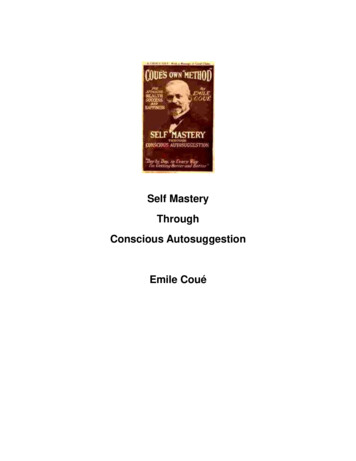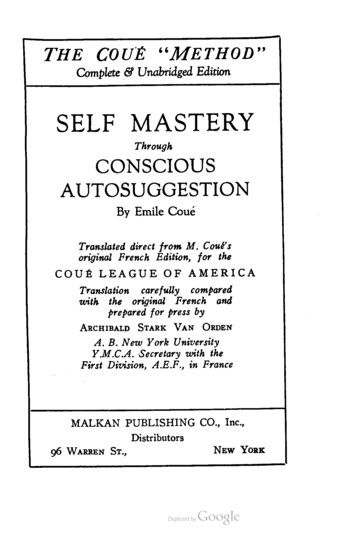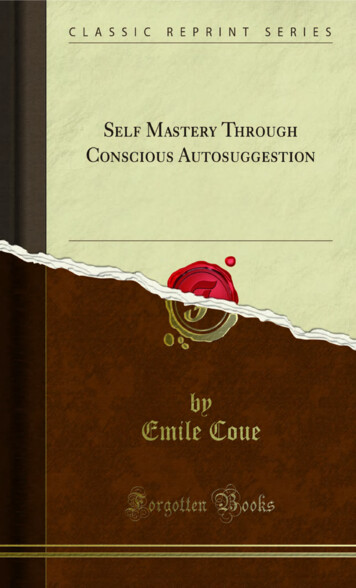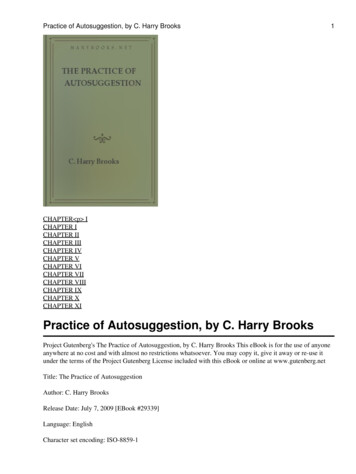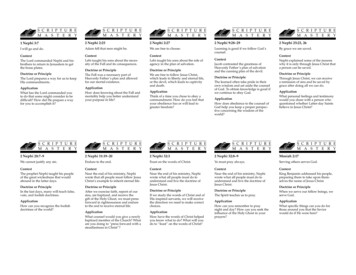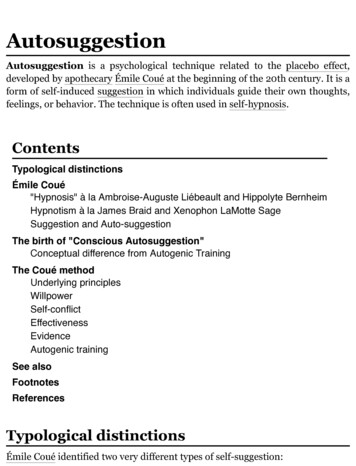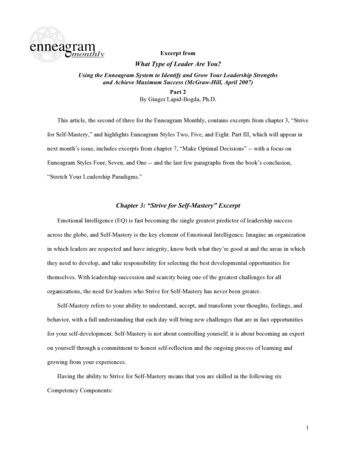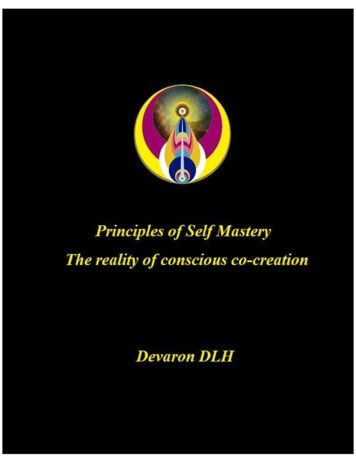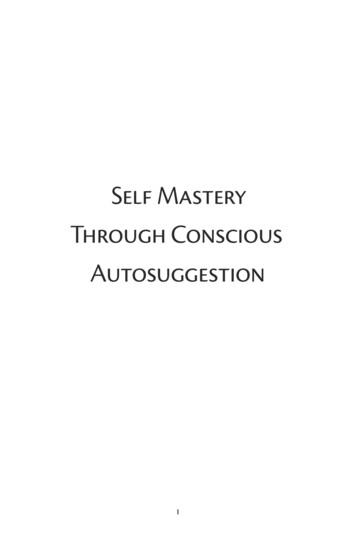
Transcription
Self MasteryThrough ConsciousAutosuggestioni
Self Mastery Through Conscious AutosuggestionWritingsSelf Master Through Conscious Autosuggestionii
Self MasteryThrough ConsciousAutosuggestion1922Emile Coué1857–1926信YOGeBooks: Hollister, MO2013:09:01:08:48:15iii
Self Mastery Through Conscious AutosuggestionCopyrightYOGeBooks by Roger L. Cole, Hollister, MO 65672 2010 YOGeBooks by Roger L. ColeAll rights reserved. Electronic edition published 2010isbn: 978-1-61183-122-1 (pdf)isbn: 978-1-61183-123-8 (epub)www.yogebooks.comiv
Epigraph“Day by day, in every way, I am getting better and better”“Our actions spring not from our Will, but from our Imagination.”v
Self Mastery Through Conscious Autosuggestionvi
ContentsSelf Mastery Through Conscious AutosuggestionThe Miracle WithinThoughts and Precepts of M. Emile CouéObservationsA Survey of the “Séances” at M. Coué’sSome Notes on the Journey of M. Coué to Paris in October, 1919Extracts From Letters Addressed to M. CouéFragments From LettersExtracts From Letters“Everything For Everyone”Education as it Ought to Bevii
Self Mastery Through Conscious Autosuggestionviii
How to Practice ConsciousAutosuggestionEvery morning before getting up and every evening as soonas you are in bed, shut your eyes, and repeat twenty timesin succession, moving your lips (this is indispensable), andcounting mechanically on a long string with twenty knots, thefollowing phrase: “Day by day, in every way, I am getting betterand better”. Do not think of anything particular, as the words“in every way” apply to everything.Make this autosuggestion with confidence, with faith, withthe certainty of obtaining what you want. The greater theconviction, the greater and the more rapid will be the resultsobtained.Further, every time in the course of the day or night thatyou feel any distress physical or mental, immediately affirmto yourself that you will not consciously contribute to it, andthat you are going to make it disappear; then isolate yourself asmuch as possible, shut your eyes, and passing your hand overyour forehead, if it is something mental, or over the part whichis painful, if it is something physical, repeat extremely quickly,moving your lips, the words: “It is going, it is going—”, etc., etc.,as long as it may be necessary. With a little practice the physicalix
Self Mastery Through Conscious Autosuggestionor mental distress will have vanished in 20 to 25 seconds. Beginagain whenever it is necessary. Avoid carefully any effort inpractising autosuggestion.Emile Couéx
Self MasteryThrough ConsciousAutosuggestion1
Self Mastery Through Conscious Autosuggestion2
Self Mastery ThroughConscious AutosuggestionSuggestion, or rather Autosuggestion, is quite a newsubject, and yet at the same time it is as old as the world.It is new in the sense that until now it has been wronglystudied and in consequence wrongly understood; it is oldbecause it dates from the appearance of man on the earth. Infact autosuggestion is an instrument that we possess at birth,and in this instrument, or rather in this force, resides a marvelousand incalculable power, which according to circumstancesproduces the best or the worst results. Knowledge of this forceis useful to each one of us, but it is peculiarly indispensable todoctors, magistrates, lawyers, and to those engaged in the workof education.By knowing how to practise it consciously it is possible in thefirst place to avoid provoking in others bad autosuggestionswhich may have disastrous consequences, and secondly,consciously to provoke good ones instead, thus bringing physicalhealth to the sick, and moral health to the neurotic and theerring, the unconscious victims of anterior autosuggestions,and to guide into the right path those who had a tendency totake the wrong one.3
Self Mastery Through Conscious AutosuggestionThe Conscious Self and the Unconscious SelfIn order to understand properly the phenomena ofsuggestion, or to speak more correctly of autosuggestion, itis necessary to know that two absolutely distinct selves existwithin us. Both are intelligent, but while one is consciousthe other is unconscious. For this reason the existence of thelatter generally escapes notice. It is however easy to prove itsexistence if one merely takes the trouble to examine certainphenomena and to reflect a few moments upon them. Let ustake for instance the following examples:Every one has heard of somnambulism; every one knowsthat a somnambulist gets up at night without waking, leaveshis room after either dressing himself or not, goes downstairs,walks along corridors, and after having executed certain acts oraccomplished certain work, returns to his room, goes to bedagain, and shows next day the greatest astonishment at findingwork finished which he had left unfinished the day before.It is however he himself who has done it without being awareof it. What force has his body obeyed if it is not an unconsciousforce, in fact his unconscious self?Let us now examine the alas, too frequent case of a drunkardattacked by delirium tremens. As though seized with madnesshe picks up the nearest weapon, knife, hammer, or hatchet, asthe case may be, and strikes furiously those who are unluckyenough to be in his vicinity. Once the attack is over, he recovershis senses and contemplates with horror the scene of carnagearound him, without realizing that he himself is the author of it.Here again is it not the unconscious self which has caused theunhappy man to act in this way?*If we compare the conscious with the unconscious selfwe see that the conscious self is often possessed of a very* And what aversions, what ills we create for ourselves, everyone of us and in everydomain by not “immediately” bringing into play “good conscious autosuggestions” againstour “bad unconscious autosuggestions,” thus bringing about the disappearance of all uniustsuffering.4
Self Mastery Through Conscious Autosuggestionunreliable memory while the unconscious self on the contraryis provided with a marvelous and impeccable memory whichregisters without our knowledge the smallest events, the leastimportant acts of our existence. Further, it is credulous andaccepts with unreasoning docility what it is told. Thus, as it isthe unconscious that is responsible for the functioning of allour organs by the intermediary of the brain, a result is producedwhich may seem rather paradoxical to you: that is, if it believesthat a certain organ functions well or ill or that we feel suchand such an impression, the organ in question does indeedfunction well or ill, or we do feel that impression.Not only does the unconscious self preside over the functionsof our organism, but also over all our actions whatever they are.It is this that we call imagination, and it is this which, contraryto accepted opinion, always makes us act even, and above all,against our will when there is antagonism between these twoforces.Will and ImaginationIf we open a dictionary and look up the word “will”, we findthis definition: “The faculty of freely determining certain acts”.We accept this definition as true and unattackable, althoughnothing could be more false. This will that we claim so proudly,always yields to the imagination. It is an absolute rule thatadmits of no exception.“Blasphemy! Paradox!” you will exclaim. “Not at all! On thecontrary, it is the purest truth,” I shall reply.In order to convince yourself of it, open your eyes, lookround you and try to understand what you see. You will thencome to the conclusion that what I tell you is not an idle theory,offspring of a sick brain but the simple expression of a fact.Suppose that we place on the ground a plank 30 feet long by1 foot wide. It is evident that everybody will be capable of goingfrom one end to the other of this plank without stepping overthe edge. But now change the conditions of the experiment,5
Self Mastery Through Conscious Autosuggestionand imagine this plank placed at the height of the towers ofa cathedral. Who then will be capable of advancing even afew feet along this narrow path? Could you hear me speak?Probably not. Before you had taken two steps you would beginto tremble, and in spite of every effort of your will you would becertain to fall to the ground.Why is it then that you would not fall if the plank is on theground, and why should you fall if it is raised to a height abovethe ground? Simply because in the first case you imagine that itis easy to go to the end of this plank, while in the second caseyou imagine that you cannot do so.Notice that your will is powerless to make you advance; ifyou imagine that you cannot, it is absolutely impossible for youto do so. If tilers and carpenters are able to accomplish this feat,it is because they think they can do it.Vertigo is entirely caused by the picture we make in ourminds that we are going to fall. This picture transforms itselfimmediately into fact in spite of all the efforts of our will, and themore violent these efforts are, the quicker is the opposite to thedesired result brought about.Let us now consider the case of a person suffering frominsomnia. If he does not make any effort to sleep, he will liequietly in bed. If on the contrary he tries to force himself tosleep by his will, the more efforts he makes, the more restlesshe becomes.Have you not noticed that the more you try to rememberthe name of a person which you have forgotten, the more iteludes you, until, substituting in your mind the idea “I shallremember in a minute” to the idea “I have forgotten”, the namecomes back to you of its own accord without the least effort?Let those of you who are cyclists remember the days whenyou were learning to ride. You went along clutching the handlebars and frightened of falling. Suddenly catching sight of thesmallest obstacle in the road you tried to avoid it, and the moreefforts you made to do so, the more surely you rushed upon it.6
Self Mastery Through Conscious AutosuggestionWho has not suffered from an attack of uncontrollablelaughter, which bursts out more violently the more one triesto control it?What was the state of mind of each person in these differentcircumstances? “I do not want to fall but I cannot help doing so”;“I want to sleep but I cannot”; “I want to remember the name ofMrs. So and So, but I cannot”; “I want to avoid the obstacle, butI cannot”; “I want to stop laughing, but I cannot.”As you see, in each of these conflicts it is always theimagination which gains the victory over the will, without anyexception.To the same order of ideas belongs the case of the leaderwho rushes forward at the head of his troops and always carriesthem along with him, while the cry “Each man for himself!” isalmost certain to cause a defeat. Why is this? It is because inthe first case the men imagine that they must go forward, andin the second they imagine that they are conquered and mustfly for their lives.Panurge was quite aware of the contagion of example, thatis to say the action of the imagination, when, to avenge himselfupon a merchant on board the same boat, he bought hisbiggest sheep and threw it into the sea, certain beforehand thatthe entire flock would follow, which indeed happened.We human beings have a certain resemblance to sheep,and involuntarily, we are irresistibly impelled to follow otherpeople’s examples, imagining that we cannot do otherwise.I could quote a thousand other examples but I should fearto bore you by such an enumeration. I cannot however passby in silence this fact which shows the enormous power ofthe imagination, or in other words of the unconscious in itsstruggle against the will.There are certain drunkards who wish to give up drinking, butwho cannot do so. Ask them, and they will reply in all sinceritythat they desire to be sober, that drink disgusts them, but that7
Self Mastery Through Conscious Autosuggestionthey are irresistibly impelled to drink against their will, in spiteof the harm they know it will do them.In the same way certain criminals commit crimes in spite ofthemselves, and when they are asked why they acted so, theyanswer “I could not help it, something impelled me, it wasstronger than I.”And the drunkard and the criminal speak the truth; they areforced to do what they do, for the simple reason they imaginethey cannot prevent themselves from doing so.Thus we who are so proud of our will, who believe that weare free to act as we like, are in reality nothing but wretchedpuppets of which our imagination holds all the strings. Weonly cease to be puppets when we have learned to guide ourimagination.Suggestion and AutosuggestionAccording to the preceding remarks we can compare theimagination to a torrent which fatally sweeps away the poorwretch who has fallen into it, in spite of his efforts to gain thebank. This torrent seems indomitable; but if you know how,you can turn it from its course and conduct it to the factory,and there you can transform its force into movement, heat,and electricity.If this simile is not enough, we may compare the imagination—“the madman at home” as it has been called—to an unbrokenhorse which has neither bridle nor reins. What can the rider doexcept let himself go wherever the horse wishes to take him?And often if the latter runs away, his mad career only comesto end in the ditch. If however the rider succeeds in putting abridle on the horse, the parts are reversed. It is no longer thehorse who goes where he likes, it is the rider who obliges thehorse to take him wherever he wishes to go.Now that we have learned to realize the enormous powerof the unconscious or imaginative being, I am going to showhow this self, hitherto considered indomitable, can be as easily8
Self Mastery Through Conscious Autosuggestioncontrolled as a torrent or an unbroken horse. But before goingany further it is necessary to define carefully two words that areoften used without being properly understood. These are thewords suggestion and autosuggestion.What then is suggestion? It may be defined as “the act ofimposing an idea on the brain of another”. Does this actionreally exist? Properly speaking, no. Suggestion does not indeedexist by itself. It does not and cannot exist except on the sinequa non condition of transforming itself into autosuggestion inthe subject. This latter word may be defined as “the implantingof an idea in oneself by oneself.”You may make a suggestion to someone; if the unconsciousof the latter does not accept the suggestion, if it has not, as itwere, digested it, in order to transform it into autosuggestion,it produces no result. I have myself occasionally made a moreor less commonplace suggestion to ordinarily very obedientsubjects quite unsuccessfully. The reason is that the unconsciousof the subject refused to accept it and did not transform it intoautosuggestion.The Use of AutosuggestionLet us now return to the point where I said that we cancontrol and lead our imagination, just as a torrent or anunbroken horse can be controlled. To do so, it is enough in thefirst place to know that this is possible (of which fact almosteveryone is ignorant) and secondly, to know by what meansit can be done. Well, the means is very simple; it is that whichwe have used every day since we came into the world, withoutwishing or knowing it and absolutely unconsciously, but whichunfortunately for us, we often use wrongly and to our owndetriment. This means is autosuggestion.Whereas we constantly give ourselves unconsciousautosuggestions, all we have to do is to give ourselves consciousones, and the process consists in this: first, to weigh carefullyin one’s mind the things which are to be the object of the9
Self Mastery Through Conscious Autosuggestionautosuggestion, and according as they require the answer “yes”or “no”, to repeat several times without thinking of anything else:“This thing is coming”, or “this thing is going away”; “this thingwill, or will not happen, etc., etc. ”.* If the unconscious acceptsthis suggestion and transforms it into an autosuggestion, thething or things are realized in every particular.Thus understood, autosuggestion is nothing but hypnotismas I see it, and I would define it in these simple words: Theinfluence of the imagination upon the moral and physical beingof mankind. Now this influence is undeniable, and withoutreturning to previous examples, I will quote a few others.If you persuade yourself that you can do a certain thing,provided this thing be possible, you will do it however difficultit may be. If on the contrary you imagine that you cannot dothe simplest thing in the world, it is impossible for you to do it,and molehills become for you unscalable mountains.Such is the case of neurasthenics, who, believing themselvesincapable of the least effort, often find it impossible even towalk a few steps without being exhausted. And these sameneurasthenics sink more deeply into their depression, the moreefforts they make to throw it off, like the poor wretch in thequicksands who sinks in all the deeper the more he tries tostruggle out.In the same way it is sufficient to think a pain is going, to feelit indeed disappear little by little, and inversely, it is enough tothink that one suffers in order to feel the pain begin to comeimmediately.I know certain people who predict in advance that they willhave a sick headache on a certain day, in certain circumstances,and on that day, in the given circumstances, sure enough, theyfeel it. They brought their illness on themselves, just as otherscure theirs by conscious autosuggestion.I know that one generally passes for mad in the eyes ofthe world if one dares to put forward ideas which it is not* Of course, the thing must be in our power.10
Self Mastery Through Conscious Autosuggestionaccustomed to hear. Well, at the risk of being thought so, Isay that if certain people are ill mentally and physically, it isthat they imagine themselves to be ill mentally or physically. Ifcertain others are paralytic without having any lesion to accountfor it, it is that they imagine themselves to be paralyzed, and itis among such persons that the most extraordinary cures areproduced. If others again are happy or unhappy, it is that theyimagine themselves to be so, for it is possible for two people inexactly the same circumstances to be, the one perfectly happy,the other absolutely wretched.Neurasthenia, stammering, aversions, kleptomania, certaincases of paralysis, are nothing but the result of unconsciousautosuggestion, that is to say the result of the action of theunconscious upon the physical and moral being.But if our unconscious is the source of many of our ills, it canalso bring about the cure of our physical and mental ailments.It can not only repair the ill it has done, but cure real illnesses,so strong is its action upon our organism.Shut yourself up alone in a room, seat yourself in an armchair,close your eyes to avoid any distraction, and concentrate yourmind for a few moments on thinking: “Such and such a thingis going to disappear”, or “Such and such a thing is coming topass.”If you have really made the autosuggestion, that is to say,if your unconscious has assimilated the idea that you havepresented to it, you are astonished to see the thing you havethought come to pass. (Note that it is the property of ideasautosuggested to exist within us unrecognized, and we canonly know of their existence by the effect they produce.) Butabove all, and this is an essential point, the will must not bebrought into play in practising autosuggestion; for, if it is notin agreement with the imagination, if one thinks: “I will makesuch and such a thing happen”, and the imagination says: “Youare willing it, but it is not going to be”, not only does one not11
Self Mastery Through Conscious Autosuggestionobtain what one wants, but even exactly the reverse is broughtabout.This remark is of capital importance, and explains why resultsare so unsatisfactory when, in treating moral ailments, onestrives to re-educate the will. It is the training of the imaginationwhich is necessary, and it is thanks to this shade of differencethat my method has often succeeded where others—and thosenot the least considered—have failed. From the numerousexperiments that I have made daily for twenty years, and whichI have examined with minute care, I have been able to deductthe following conclusions which I have summed up as laws:1. When the will and the imagination are antagonistic, it isalways the imagination which wins, without any exception.2. In the conflict between the will and the imagination, theforce of the imagination is in direct ratio to the square of the will.3. When the will and the imagination are in agreement, onedoes not add to the other, but one is multiplied by the other.4. The imagination can be directed.(The expressions “In direct ratio to the square of the will”and “Is multiplied by” are not rigorously exact. They are simplyillustrations destined to make my meaning clearer.)After what has just been said it would seem that nobodyought to be ill. That is quite true. Every illness, whatever itmay be, can yield to autosuggestion, daring and unlikely as mystatement may seem; I do not say does always yield, but canyield, which is a different thing.But in order to lead people to practise consciousautosuggestion they must be taught how, just as they aretaught to read or write or play the piano.Autosuggestion is, as I said above, an instrument that wepossess at birth, and with which we play unconsciously all ourlife, as a baby plays with its rattle. It is however a dangerousinstrument; it can wound or even kill you if you handle itimprudently and unconsciously. It can on the contrary saveyour life when you know how to employ it consciously. One can12
Self Mastery Through Conscious Autosuggestionsay of it as Æsop said of the tongue: “It is at the same time thebest and the worst thing in the world”.I am now going to show you how everyone can profit bythe beneficent action of autosuggestion consciously applied.In saying “every one”, I exaggerate a little, for there are twoclasses of persons in whom it is difficult to arouse consciousautosuggestion:1. The mentally undeveloped who are not capable ofunderstanding what you say to them.2. Those who are unwilling to understand.How to Teach Patients to Make AutosuggestionsThe principle of the method may be summed up in these fewwords: It is impossible to think of two things at once, that is tosay that two ideas may be in juxtaposition, but they cannot besuperimposed in our mind.Every thought entirely filling our mind becomes true . for usand tends to transform itself into action.Thus if you can make a sick person think that her troubleis getting better, it will disappear; if you succeed in making akleptomaniac think that he will not steal any more, he willcease to steal, etc., etc.This training which perhaps seems to you an impossibility,is, however, the simplest thing in the world. It is enough, by aseries of appropriate and graduated experiments, to teach thesubject, as it were the A. B. C. of conscious thought, and hereis the series: by following it to the letter one can be absolutelysure of obtaining a good result, except with the two categoriesof persons mentioned above.First experiment.* Preparatory.—Ask the subject to standupright, with the body as stiff as an iron bar, the feet closetogether from toe to heel, while keeping the ankles flexible asif they were hinges. Tell him to make himself like a plank withhinges at its base, which is balanced on the ground. Make him* These experiments are those of Sage of Rochester.13
Self Mastery Through Conscious Autosuggestionnotice that if one pushes the plank slightly either way it fallsas a mass without any resistance, in the direction in which itis pushed. Tell him that you are going to pull him back by theshoulders and that he must let himself fall in your arms withoutthe slightest resistance, turning on his ankles as on hinges, thatis to say keeping the feet fixed to the ground. Then pull himback by the shoulders and if the experiment does not succeed,repeat it until it does, or nearly so.Second experiment.—Begin by explaining to the subject thatin order to demonstrate the action of the imagination uponus, you are going to ask him in a moment to think: “I am fallingbackwards, I am falling backwards ” Tell him that he musthave no thought but this in his mind, that he must not reflector wonder if he is going to fall or not, or think that if he falls hemay hurt himself, etc., or fall back purposely to please you, butthat if he really feels something impelling him to fall backwards,he must not resist but obey the impulse.Then ask your subject to raise the head high and to shut hiseyes, and place your right fist on the back of his neck, and yourleft hand on his forehead, and say to him: “Now think: I amfalling backwards, I am falling backwards, etc., etc ” and, indeed,“You are falling backwards, You are fall ing back wards,etc.” At the same time slide the left hand lightly backwards tothe left temple, above the ear, and remove very slowly but witha continuous movement the right fist.The subject is immediately felt to make a slight movementbackwards, and either to stop himself from falling or else tofall completely. In the first case, tell him that he has resisted,and that he did not think just that he was falling, but that hemight hurt himself if he did fall. That is true, for if he had notthought the latter, he would have fallen like a block. Repeatthe experiment using a tone of command as if you would forcethe subject to obey you. Go on with it until it is completelysuccessful or very nearly so. The operator should stand a littlebehind the subject, the left leg forward and the right leg well14
Self Mastery Through Conscious Autosuggestionbehind him, so as not to be knocked over by the subject whenhe falls. Neglect of this precaution might result in a double fallif the person is heavy.Third experiment.—Place the subject facing you, the bodystill stiff, the ankles flexible, and the feet joined and parallel.Put your two hands on his temples without any pressure, lookfixedly, without moving the eyelids, at the root of his nose, andtell him to think: “I am falling forward, I am falling forward .”and repeat to him, stressing the syllables, “You are fall ing for ward, You are fall ing for ward ” without ceasing to lookfixedly at him.Fourth experiment.—Ask the subject to clasp his hands astight as possible, that is to say, until the fingers tremble slightly,look at him in the same way as in the preceding experiment andkeep your hands on his as though to squeeze them togetherstill more tightly. Tell him to think that he cannot unclasp hisfingers, that you are going to count three, and that when yousay “three” he is to try to separate his hands while thinking allthe time: “I cannot do it, I cannot do it ” and he will find itimpossible. Then count very slowly, “one, two, three”, and addimmediately, detaching the syllables: “You can not do it You can not do it . . “ If the subject is thinking properly, “Icannot do it”, not only is he unable to separate his fingers, butthe latter clasp themselves all the more tightly together themore efforts he makes to separate them. He obtains in factexactly the contrary to what he wants. In a few moments sayto him: Now think: “I can do it,” and his fingers will separatethemselves.Be careful always to keep your eyes fixed on the root of thesubject’s nose, and do not allow him to turn his eyes away fromyours for a single moment. If he is able to unclasp his hands,do not think it is your own fault, it is the subject’s, he has notproperly thought: “I cannot”. Assure him firmly of this, andbegin the experiment again.15
Self Mastery Through Conscious AutosuggestionAlways use a tone of command which suffers no disobedience.I do not mean that it is necessary to raise your voice; on thecontrary it is preferable to employ the ordinary pitch, but stressevery word in a dry and imperative tone.When these experiments have been successful, all the otherssucceed equally well and can be easily obtained by carrying outto the letter the instructions given above.Some subjects are very sensitive, and it is easy to recognizethem by the fact that the contraction of their fingers and limbsis easily produced. After two or three successful experiments,it is no longer necessary to say to them: “Think this”, or “thinkthat”; You need only, for example, say to them simply—but inthe imperative tone employed by all good suggestionists—“Close your hands; now you cannot open them”. “Shut youreyes; now you cannot open them,” and the subject finds itabsolutely impossible to open the hands or the eyes in spite ofall his efforts. Tell him in a few moments: “You can do it now,”and the de-contraction takes place instantaneously.These experiments can be varied to infinity. Here are a fewmore: Make the subject join his hands, and suggest that theyare welded together; make him put his hand on the table, andsuggest that it is stuck to it; tell him that he is fixed to his chairand cannot rise; make him rise, and tell him he cannot walk;put a penholder on the table and tell him that it weighs ahundredweight, and that he cannot lift it, etc., etc.In all these experiments, I cannot repeat too often, it is notsuggestion properly so-called which produces the phenomena,but the autosuggestion which is consecutive to the suggestionof the operator.Method of Procedure in Curative SuggestionWhen the subject has passed through the precedingexperiments and has understood them, he is ripe for curativesuggestion. He is like a cultivated field in which the seed can16
Self Mastery Through Conscious Autosuggestiongerminate and develop, whereas before it was but rough earthin which it would have perished.Whatever ailment the subject suffers from, whether it isphysical or mental, it is important
uggestion, or rather Autosuggestion, is quite a new subject, and yet at the same time it is as old as the world. It is new in the sense that until now it has been wrongly studied and in consequence wrongly understood; it is old because it dates from the appearance of man on the earth. In fact autosuggestion is an instrument that we possess at .

